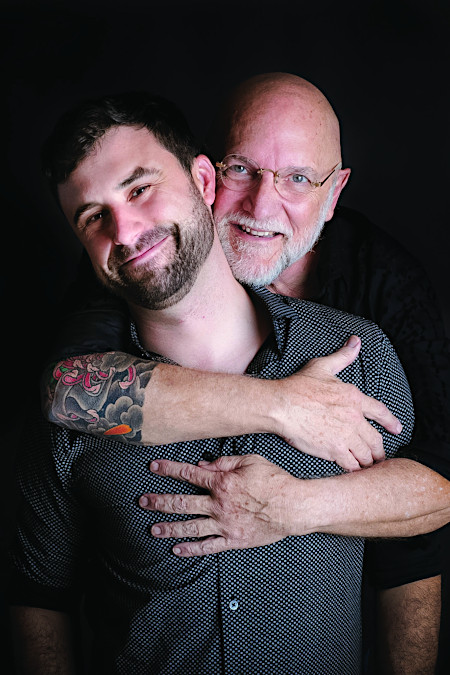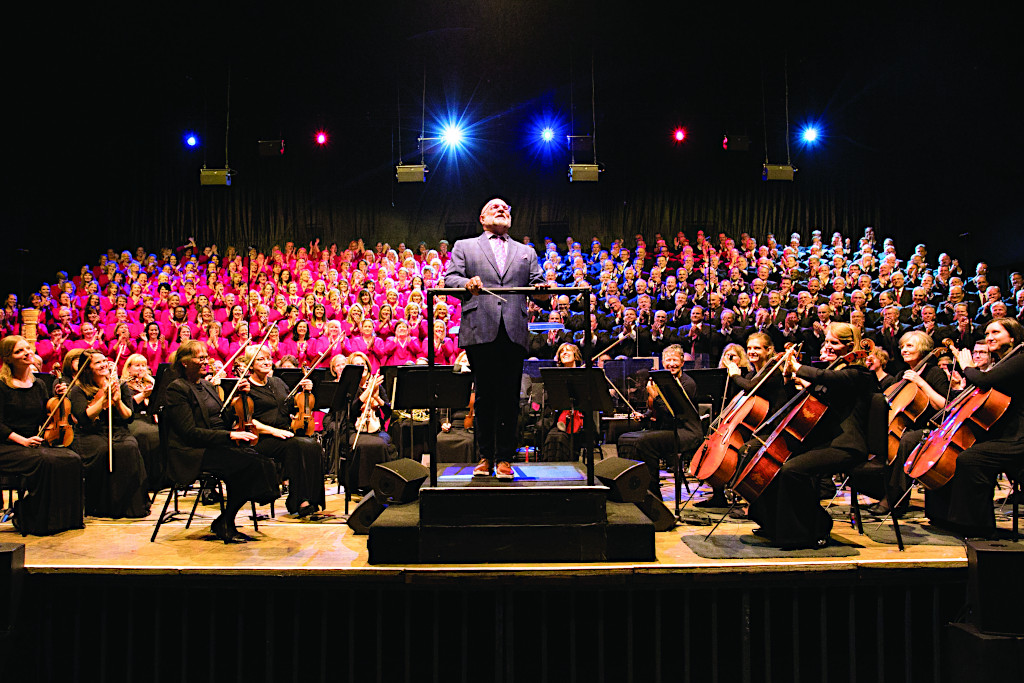Dr. Tim Seelig uses a baton, not a wand, to create magic. The Artistic Director and Conductor of the 42-year-old, trailblazing San Francisco Gay Men’s Chorus (www.sfgmc.org), Seelig has brought joy, comfort, healing, catharsis, and impeccable arrangements to the group and its audiences since accepting the position in 2011. Last year’s inspiring, moving documentary, Gay Chorus Deep South (www.gaychorusdeepsouth.com) , chronicled the Texas-born Seelig and the SFGMC’s concert tour of southern states in response to a wave of anti-LGBTQ legislation in the region, like NC’s inafmous HB2 “bathroom bill.”
Raised in a Southern Baptist family and closeted until his 30s, Seelig, who previously worked with Dallas’ LGBTQ+ Turtle Creek Chorale (www.turtlecreekchorale.com) for 20 years, boasts an incredible resume and bio. Packed with highs (he carried the Olympic torch in 1996, met Queen Elizabeth II in 1992, was friends with Maya Angelou, and conducted at Carnegie Hall and Lincoln Center dozens of times), and the ocassional low (in 2013, he and his partner at the time, Dan England, were denied a time share vacation because they were gay). Seelig’s more recent developments include the renovation of the SFGMC’s Mission District art deco building, which was puchased in 2019, and celebrating the second year of his relationship with singer-songwriter Bobby Jo Valentine. “His name sounds like a country star,” Seelig notes.
Seelig opened up to Passport about his career and life, from married-with-twochildren and being an aspiring Southern Baptist opera singer living in Salzburg, Austria, to serving as an associate minister of music at the First Baptist Church of Houston, to coming out and working with LGBTQ choruses.

Bobby Jo Valentine & Tim Seelig
Photo: David Sachs
You moved to Salzburg, Austria at age 24 with a wife and two kids to pursue a career as an opera singer. How did that come about, and how did living there affect you and your development as a person, especially someone from a sheltered, religious and presumably homophobic culture?
That’s a great question. I was hellbent when I entered college on becoming an opera singer. I have no idea why, when I was from Fort Worth Texas, but somehow it stuck in my head. As a teenager I had been to Europe and saw a school named after Mozart in Salzburg, (Mozarteum), and decided I would go there. I’m a driven, goal-oriented person, and when I was 24 I attended for 2 years. Then later I got the fulltime opera singing job. I was thrilled. It was magic, singing on the set of the Sound of Music, and I think probably being that far away from home in countries that speak a different language affected me really deeply. You get away from that nest, from the Southern Baptist Church, and seeing these people drink beer and have sex before marriage was eyeopening and wonderful. It broadened my world inside. I was ready to come home, and I realized that wasn’t the career for me.
How did your life, marriage, and spirituality change after that?
I threw the baby out with the bathwater for sure, when I came out at 35 and lost pretty much everything. I was done with organized religion. Getting into the LGBTQ community was really comfortable, because nobody was forcing you to go to church or be a part of organized religion. When I started conducting a gay men’s chorus, I realized that void of spirituality was huge, so finding music that spoke to that has been the focus of my last 33 years. Personally, I’m a lover of the human experience, and I’m definitely agnostic leaning towards atheist. During the Gay Chorus Deep South tour I did go back to the Southern Baptist church in Greenville, SC. The chorus did a big concert there, and it was amazing and something I thought would never happen. The end of the film was like a reconciliation.
How was the reality of going to the south with the SFGMC different from how you imagined it would be beforehand?
Oh my goodness. I straddled both of those worlds. I was in Texas until the age of 60, and then I moved to California and the difference in being there and here is remarkable. I live in the bubble of San Francisco and love the bubble, and then going back to something so ingrained in me…It was fine. The folks out here who had never been to the south or even Northern California were literally scared. Our board approved quite a large security budget, and then two weeks before we left, Charlottesville happened and they doubled the budget. So many people thought that’s what we would walk into. A KKK rally. The trip was planned really well, we had police escorts and assistance from local and state law enforcement, so I wasn’t frightened. My perception was we would get more pushback than we did, and the overall reaction of our chorus is well documented in the film in that we found these southern people to be courageous. Many have chosen to stay there and lead the fight. Here we are in SF, life’s pretty good and we say we’re activists and we are, but nothing like the trans woman in Jackson, Mississippi, or the small AIDS office in Charlotte, NC and the things those people go through every day! They turned out being our heroes for sure, and they’re fighting the good fight.
Did anything get cut out of the film that you wish had been included?
Of course. They had 300 hours of film. There’s one really funny number that I loved, it’s a song called “Color Out of Colorado,” and goes through all the states. “You can’t take the sissy out of Mississippi, you can’t take the KY out of Kentucky.” It’s very funny. They also chose not to show some of the other things that happened, like when we got to the first Baptist Church of Greenville, SC. We did our soundcheck in the big sanctuary and they said, ‘we’re going to cut this a little short and let’s go to the Fellowship Hall and get you something to eat.’ I thought that was strange because I wasn’t finished rehearsing, and it turns out they had a bomb threat and the local police came and swept the sanctuary. There wasn’t a bomb, it was a hoax, but we didn’t know that. We didn’t even know why we were kicked out until they said it was all clear.
This wasn’t the first time you’ve been in a documentary. You were also featured prominently in the 1994 Emmy-winning After Goodbye: An AIDS Story, in which the Turtle Creek Chorale copes with losing over 90 members to HIV and AIDS.
That was difficult. I was a baby, and they filmed for 18 months in a lot of hospitals as people were dying and at memorial services.
You moved to San Francisco in 2011 after joining the SFGMC. What’s your impression of the famously changing face of the city?
Yeah, oh boy. The separation of haves and have nots, the rich and poor, is happening all over the country, and SF is a textbook case of where the country is going unless we stop it. We have the rich rich and an incredible homeless problem. People can’t afford to live. The hardest part for me is young kids move here, wanting to live in a gay Mecca and sing in the gay chorus, they join it and make minimum wage at Starbucks, and they can’t make it. They get four roommates in a two bedroom apartment and try really hard and then the disappointment hits and we lose a lot of them. They’ve watched Tales of the City and think Miss Madrigal is here to take them in. She’s gone!


